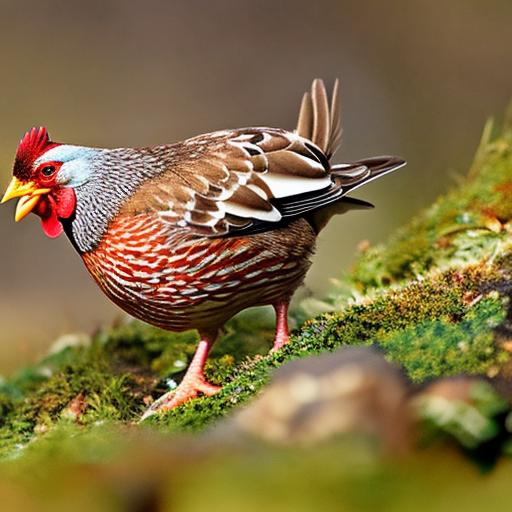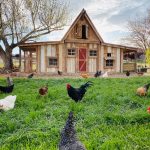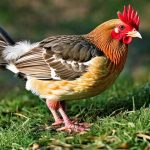Keeping chickens as a hobby or for egg production has become increasingly popular in recent years. Many people are drawn to the idea of having fresh eggs daily, as well as the joy of watching chickens and their quirky personalities. Additionally, chicken manure is an excellent fertilizer for gardens. In this article, we will explore the benefits of keeping chickens, factors to consider before getting started, choosing the right chicken breed, setting up a chicken coop, maintaining a clean and safe environment, feeding and watering chickens, protecting them from predators, common health issues in chickens, and conclude with some final thoughts.
Key Takeaways
- Keeping chickens can provide a variety of benefits, including fresh eggs, natural pest control, and fertilizer for gardens.
- Before deciding to keep chickens, it’s important to consider factors such as local regulations, available space, and the time and effort required for care.
- Choosing the right chicken breed depends on factors such as climate, egg production, and temperament.
- Setting up a chicken coop involves considerations such as size, ventilation, and predator-proofing.
- Maintaining a clean and safe chicken coop involves regular cleaning, proper waste disposal, and monitoring for signs of illness.
Benefits of Keeping Chickens
One of the main benefits of keeping chickens is having fresh eggs daily. There is nothing quite like going out to your backyard and collecting eggs that were laid that morning. Not only are fresh eggs delicious, but they are also more nutritious than store-bought eggs. Chickens that are allowed to roam and forage for their food produce eggs that are higher in omega-3 fatty acids and vitamins A and E.
Another benefit of keeping chickens is the joy they bring to your life. Chickens have unique personalities and watching them can be highly entertaining. They have their own social hierarchy and will often engage in funny behaviors such as dust bathing or chasing after bugs. Chickens can also be quite affectionate and will often come running when called.
In addition to providing fresh eggs and entertainment, chickens also produce valuable fertilizer for your garden. Chicken manure is rich in nitrogen, phosphorus, and potassium, which are essential nutrients for plant growth. By composting chicken manure and using it in your garden, you can improve soil fertility and promote healthy plant growth.
Factors to Consider Before Keeping Chickens
Before getting started with keeping chickens, there are several factors to consider. First and foremost, it is important to check local laws and regulations regarding backyard chicken keeping. Some areas have restrictions on the number of chickens you can have or require permits. It is important to ensure that you are in compliance with these regulations to avoid any legal issues.
Another factor to consider is the time commitment required for daily care and maintenance. Chickens require daily feeding, watering, and egg collection. They also need their coop cleaned regularly to maintain a clean and healthy environment. Additionally, chickens may require medical attention from time to time, so it is important to be prepared for the responsibility of caring for their health.
Lastly, it is important to have adequate space and resources for your chickens. Chickens need enough space to roam and forage, as well as a secure coop to protect them from predators. They also need access to fresh water and a balanced diet to ensure their health and well-being.
Choosing the Right Chicken Breed
When it comes to choosing the right chicken breed, there are several factors to consider. First, you need to decide whether you want chickens for egg production or as pets. Some breeds are better suited for egg production, while others are known for their friendly and docile nature.
There are three main types of chicken breeds: meat breeds, egg-laying breeds, and dual-purpose breeds. Meat breeds are bred specifically for meat production and grow quickly. Egg-laying breeds are known for their high egg production, while dual-purpose breeds are a combination of both meat and egg production.
It is also important to choose healthy chicks or adult birds when starting your flock. Look for birds that are alert, active, and have clean feathers. Avoid birds that appear sick or have any signs of illness. It is also a good idea to purchase from reputable breeders or hatcheries to ensure the health and quality of your birds.
Setting Up a Chicken Coop
Setting up a chicken coop is an essential part of keeping chickens. There are several types of chicken coops available, including traditional coops, mobile coops, and chicken tractors. The type of coop you choose will depend on your specific needs and preferences.
When setting up a chicken coop, it is important to provide adequate space for your chickens. The general rule of thumb is to allow 4 square feet of space per chicken inside the coop and 10 square feet per chicken in the outdoor run. This will ensure that your chickens have enough room to move around comfortably.
Ventilation is also important in a chicken coop to prevent the buildup of moisture and ammonia. Make sure that your coop has windows or vents that can be opened and closed as needed. This will help regulate the temperature and keep the air fresh inside the coop.
Nesting boxes and roosting bars are also essential features of a chicken coop. Nesting boxes provide a safe and comfortable place for hens to lay their eggs, while roosting bars give chickens a place to perch at night. Make sure to provide enough nesting boxes for your hens and enough roosting space for all of your chickens.
Maintaining a Clean and Safe Chicken Coop

Maintaining a clean and safe chicken coop is crucial for the health and well-being of your chickens. Regular cleaning and maintenance will help prevent the buildup of bacteria, parasites, and disease.
One important aspect of maintaining a clean coop is proper waste management. Chicken manure can quickly accumulate and become a breeding ground for bacteria and parasites. Regularly cleaning out the coop and removing soiled bedding will help keep your chickens healthy.
Pest control is another important aspect of maintaining a clean coop. Common pests that can infest chicken coops include mites, lice, fleas, and rodents. Regularly inspecting your coop for signs of pests and taking appropriate measures to control them will help keep your chickens safe.
Providing a safe and secure environment is also essential for the well-being of your chickens. Make sure that your coop is predator-proof by using sturdy fencing and secure locks. Regularly inspect the coop for any signs of damage or weakness and repair them promptly.
Feeding and Watering Chickens
Feeding and watering chickens properly is essential for their health and productivity. Chickens require a balanced diet that includes a combination of grains, protein, vitamins, and minerals.
There are several types of chicken feed available, including pellets, crumbles, and mash. Pellets are the most common type of feed and are easy to store and feed. Crumbles are smaller pieces of feed that are easier for young chicks to eat. Mash is a finely ground feed that can be mixed with water to create a wet mash.
In addition to their regular feed, chickens also enjoy treats and supplements. Treats such as fruits, vegetables, and mealworms can be given in moderation as a special treat. Supplements such as oyster shell or grit can also be provided to help with digestion and eggshell production.
Clean and fresh water should be provided to chickens at all times. Chickens require a lot of water, especially during hot weather. Make sure to clean and refill their water containers daily to ensure that they have access to clean water.
Protecting Chickens from Predators
Protecting chickens from predators is an important part of keeping them safe. There are several common predators that pose a threat to chickens, including raccoons, foxes, coyotes, dogs, cats, hawks, and owls.
One of the best ways to protect chickens from predators is by providing adequate fencing. A sturdy fence that is buried at least 12 inches underground will help prevent predators from digging under it. Make sure that the fence is tall enough to prevent predators from jumping over it.
Other security measures that can be taken include installing motion-activated lights or alarms around the coop, using predator-proof locks on doors and windows, and keeping the coop clean and free of food scraps that may attract predators.
It is also important to be vigilant and proactive in protecting your chickens. Regularly inspect the coop and surrounding area for signs of predators and take appropriate measures to deter them. This may include removing attractants such as fallen fruit or securing garbage cans.
Common Health Issues in Chickens
Chickens, like any other animal, can experience health issues from time to time. Some common health issues in chickens include respiratory infections, parasites, egg-binding, bumblefoot, and mites.
Regular health checks are important to catch any potential health issues early on. Look for signs of illness such as lethargy, loss of appetite, abnormal droppings, or changes in behavior. If you notice any of these signs, it is important to seek veterinary care as soon as possible.
Preventative measures such as regular cleaning and maintenance, proper nutrition, and good hygiene practices can help reduce the risk of health issues in chickens. It is also important to quarantine new birds before introducing them to your existing flock to prevent the spread of disease.
Conclusion and Final Thoughts
Keeping chickens can be a rewarding and enjoyable hobby or a practical way to have fresh eggs daily. However, it is important to do your research and consider all the factors before getting started. Checking local laws and regulations, understanding the time commitment required, providing adequate space and resources, choosing the right breed, setting up a chicken coop, maintaining a clean and safe environment, feeding and watering chickens properly, protecting them from predators, and being aware of common health issues are all important aspects of keeping chickens successfully.
By taking the time to educate yourself and plan ahead, you can create a happy and healthy environment for your chickens. The joys and rewards of keeping chickens are many – from the satisfaction of collecting fresh eggs daily to the entertainment provided by their quirky personalities. So, if you are considering keeping chickens, take the plunge and enjoy the wonderful world of backyard chicken keeping.
If you’re considering keeping chickens, you may also be interested in learning about the importance of a well-designed chicken coop. A good chicken coop not only provides a safe and comfortable environment for your feathered friends but also makes it easier for you to care for them. Poultry Wizard offers a helpful article on “10 Essential Features of a Chicken Coop” that covers everything from proper ventilation and insulation to nesting boxes and roosting bars. Check it out here to ensure you have all the information you need to create the perfect home for your chickens.
FAQs
What are the basic requirements for keeping chickens?
Chickens require a secure coop or shelter, access to fresh water and food, and a suitable outdoor space for exercise and foraging.
How much space do chickens need?
Chickens need at least 4 square feet of indoor space per bird and at least 10 square feet of outdoor space per bird.
What do chickens eat?
Chickens eat a variety of foods including commercial chicken feed, grains, vegetables, fruits, and insects.
Do chickens require a lot of maintenance?
Chickens require daily maintenance such as providing fresh water and food, cleaning the coop, and collecting eggs. However, they do not require a lot of time or effort.
Are chickens noisy?
Chickens can be noisy, especially when they are laying eggs or when they feel threatened. However, some breeds are quieter than others.
Do chickens attract pests?
Chickens can attract pests such as rodents and flies. However, proper coop maintenance and cleaning can help prevent pest problems.
Are chickens easy to care for?
Chickens are generally easy to care for as long as their basic needs are met. They are hardy animals and can tolerate a range of temperatures and weather conditions.
Meet Walter, the feathered-friend fanatic of Florida! Nestled in the sunshine state, Walter struts through life with his feathered companions, clucking his way to happiness. With a coop that’s fancier than a five-star hotel, he’s the Don Juan of the chicken world. When he’s not teaching his hens to do the cha-cha, you’ll find him in a heated debate with his prized rooster, Sir Clucks-a-Lot. Walter’s poultry passion is no yolk; he’s the sunny-side-up guy you never knew you needed in your flock of friends!







